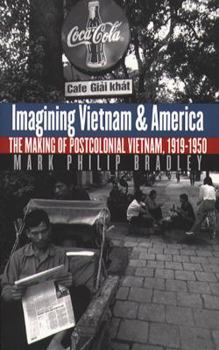Imagining Vietnam and America: The Making of Postcolonial Vietnam, 1919-1950
(Part of the The New Cold War History Series and New Cold War History Series)
Select Format
Select Condition 
Book Overview
In this study of the encounter between Vietnam and the United States from 1919 to 1950, Mark Bradley fundamentally reconceptualizes the origins of the Cold War in Vietnam and the place of postcolonial Vietnam in the history of the twentieth century. Among the first Americans granted a visa to undertake research in Vietnam since the war, Bradley draws on newly available Vietnamese-language primary sources and interviews as well as archival materials...
Format:Paperback
Language:English
ISBN:0807848611
ISBN13:9780807848616
Release Date:September 2000
Publisher:University of North Carolina Press
Length:320 Pages
Weight:1.68 lbs.
Dimensions:0.8" x 6.1" x 9.2"
Customer Reviews
2 ratings
(Re)Conceptualizing the Cold War in Vietnam
Published by Thriftbooks.com User , 14 years ago
In this study of the confluence between Vietnam and the United States from 1919 to 1950, Mark Bradley in effect reconceptualizes the origins of the Cold War in Vietnam and the position of a postcolonial Vietnam in the narrative of the 20th century. According to Bradley, "The global discourse and practices of colonialism, race, modernism, and postcolonial state making at once preceded, were profoundly implicated in, and ultimately transcended the dynamics of the Cold War (Bradley, Imagining Vietnam and America 8). Moreover, that American views (once that Vietnamese shared) were, "a variation, rather than a sharp departure, from the hierarchical conceptions of racial difference and the exercise of power at the heart of European colonialism (Bradley, Imagining Vietnam and America 105). What if, in the immediate postwar years, the US had displayed a more accurate understanding of the Vietnamese struggle for freedom from the colonial yoke; could some 20 years of bloodshed have been avoided? As a point of method, Bradley extracts on newly available Vietnamese-language primary sources and interviews as well as archival materials from France, Great Britain, and the United States to show how American officials tried to extract the French their colonial role and to push indigenous Vietnamese participation (in this case Bao Dai) in their country's economy. Bradley writes with about the admiration by the Vietnamese of American history. Ironically, many of these same nationalists, who expressed reverence and respect for American ideals would become communists in North Vietnam and fiercely fight the US. In the end, we cannot but be struck sense of failed opportunity.
ironies abound
Published by Thriftbooks.com User , 16 years ago
From an already fragmentary record, Bradley describes a Vietnam in its last years of French and Japanese colonialism. A sense of piquancy pervades the narrative. We see how American officials tried to wean the French off their colonial role and to encourage indigenous ["native"] Vietnamese participation in their country's economy. There is also shown admiration by the Vietnamese of American history. Ironic in light of how later many of these nationalists would become communists in north Vietnam and fiercely fight the US. A current reader cannot fail but be struck by a sense of failed opportunity. What if, in the immediate postwar years, the US had displayed a more accurate understanding of the Vietnamese communists. Some 2 decades of bloodshed might have been avoided. Of course, this is with hindsight. But still...






